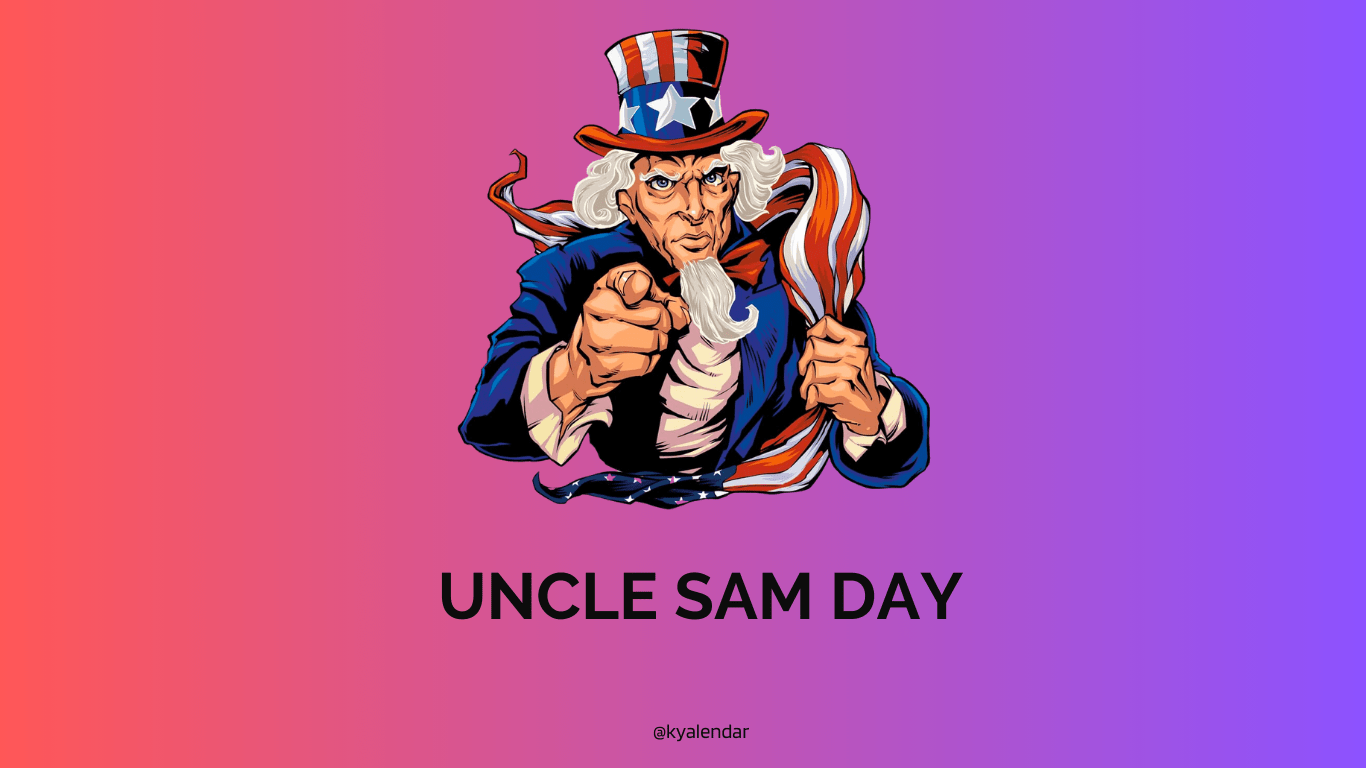
- This event has passed.
Uncle Sam Day
September 13

Uncle Sam Day, observed annually on the 13th of September, is a celebration dedicated to one of the most iconic figures in American culture. Uncle Sam, with his tall stature, white beard, and top hat adorned with stars and stripes, is a personification of the United States government. His image has been a symbol of patriotism, unity, and the American spirit for over a century.
The Origins of Uncle Sam
The character of Uncle Sam is believed to have originated during the War of 1812, though the figure became more widely recognised in the years that followed. The name “Uncle Sam” is thought to be derived from Samuel Wilson, a meatpacker from Troy, New York. Wilson supplied barrels of beef to the United States Army during the war, and these barrels were stamped with the initials “U.S.”—which stood for the United States. However, soldiers began to refer to the rations as coming from “Uncle Sam,” and the name stuck. Over time, Uncle Sam evolved from a nickname into a national symbol.
Samuel Wilson himself became the face of this symbol, with his likeness said to have inspired the now-famous depiction of Uncle Sam. Although there is some debate about the exact origins, the association with Samuel Wilson is widely accepted, and in 1961, the U.S. Congress officially recognised him as the progenitor of Uncle Sam.
Evolution of the Image
The image of Uncle Sam that we are familiar with today was largely popularised during the early 20th century. The most iconic representation of Uncle Sam comes from a World War I recruitment poster created by artist James Montgomery Flagg in 1917. The poster features Uncle Sam pointing directly at the viewer with the words “I Want YOU for U.S. Army” emblazoned below. This image became a powerful tool for recruitment and propaganda, embodying the call to serve the nation.
Over the decades, Uncle Sam’s image has been used in various contexts, from political cartoons to advertisements, always representing the United States government or the American people. His stern yet reassuring appearance has made him a figure of authority and trust.
Significance of Uncle Sam Day
Uncle Sam Day is celebrated on the 13th of September to coincide with the birthday of Samuel Wilson, born on this day in 1766. The day honours both the historical figure of Samuel Wilson and the symbolic character of Uncle Sam. It serves as a reminder of the nation’s history and the enduring symbols that unite its people.
In many ways, Uncle Sam Day is about more than just the man or the image; it is about the ideals that the character represents. Uncle Sam is a symbol of American values such as freedom, democracy, and resilience. Celebrating this day allows people to reflect on the nation’s past, its struggles, and the principles that have shaped it.
How Uncle Sam Day is Celebrated
The celebration of Uncle Sam Day is often low-key, with most activities centred around education and reflection rather than grand festivities. Schools and educational institutions may take the opportunity to teach students about the history of Uncle Sam and his significance in American culture. History buffs might delve into the origins of the character, exploring how he has been depicted in various forms of media over the years.
In Troy, New York, where Samuel Wilson lived, Uncle Sam Day holds special significance. The city often hosts events such as historical reenactments, parades, and ceremonies to honour its famous resident. These events provide an opportunity for the community to come together and celebrate their local heritage.
Some people might choose to mark the day by engaging in patriotic activities, such as displaying the American flag, reading about the history of the United States, or even dressing up as Uncle Sam himself. While the day is specifically American, the themes of patriotism and national pride resonate with people in many other countries as well.
Uncle Sam in Modern Culture
Even today, Uncle Sam remains a relevant figure in American culture. His image continues to be used in political discourse, often as a representation of the U.S. government. In advertisements, he is sometimes depicted in a humorous or satirical manner, reflecting the changing attitudes of the public.
Uncle Sam’s influence extends beyond just visual representation. The phrase “Uncle Sam” is still commonly used as a metonym for the U.S. government, and references to the character can be found in literature, film, and music. This enduring presence speaks to the powerful role that symbols play in shaping national identity.
Conclusion
Uncle Sam Day is a celebration of a symbol that has come to represent the essence of the United States. Whether viewed as a figure of authority, a call to patriotism, or simply a piece of historical trivia, Uncle Sam occupies a unique place in American culture. Celebrating this day allows us to look back at the roots of this iconic character and appreciate the values he embodies.
On the 13th of September, as we remember Samuel Wilson and the creation of Uncle Sam, we are reminded of the power of symbols in uniting a nation. Uncle Sam is not just an image; he is a representation of the American spirit, calling on each generation to uphold the principles of freedom and democracy that define the nation.